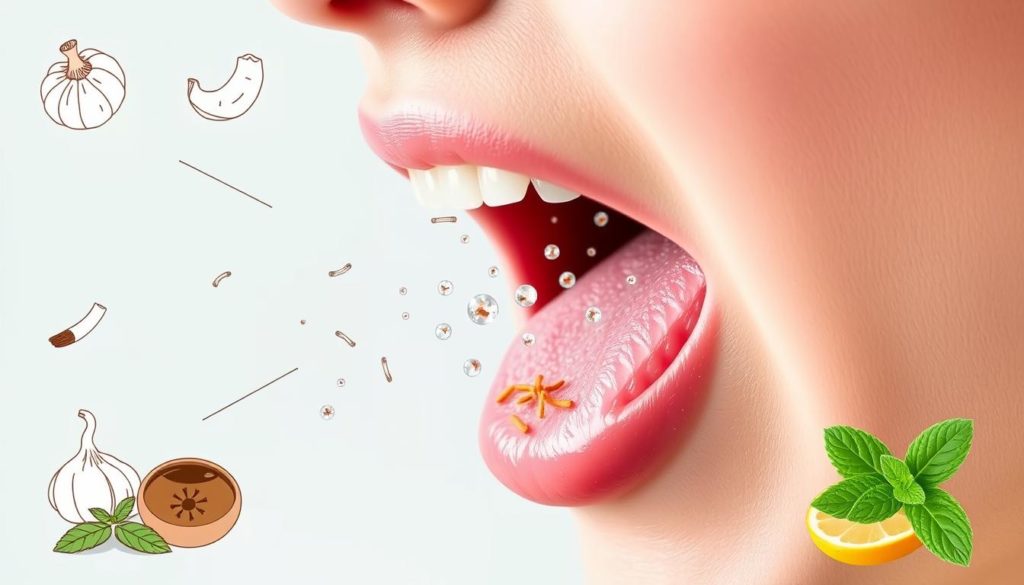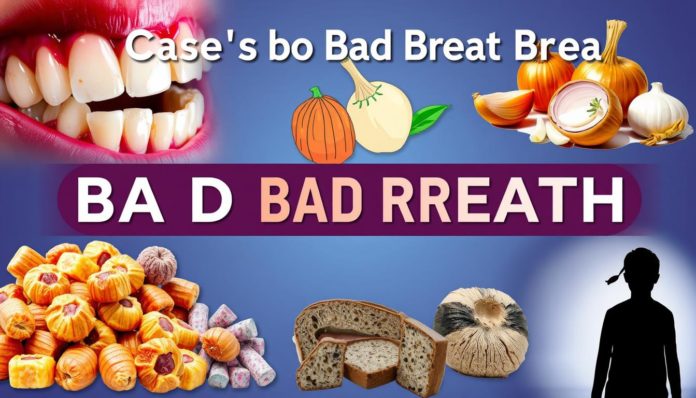Nearly half of American adults deal with chronic bad breath. This situation can really affect their daily interactions and confidence. Bad breath is often a sign of dental or health issues. It can come from eating certain foods or from conditions like gum disease and dry mouth. Knowing why bad breath happens is key to keeping your mouth healthy.
Bad breath can be embarrassing and harmful, but it is often something you can prevent. With the right care, you don’t have to struggle with it. We’ll explore the main reasons for bad breath and how to keep your breath fresh. This way, you can stay confident in your social life.
Understanding Halitosis
Halitosis, or bad breath, affects how we interact with others. Sometimes, people don’t know they have it. It’s important to know what causes it and how to fix it.

What is Halitosis?
Halitosis means your breath smells bad for a long time. It can be caused by not brushing well, eating certain foods, smoking, or health problems. Foods like garlic and coffee can make it worse.
Common Symptoms of Halitosis
The main sign is your breath smells bad when you talk or breathe. You might also have a dry mouth, a bad taste, or a coated tongue. Spotting these early helps you treat it quickly.
Diagnosis and Treatment
Dentists usually find halitosis during check-ups. They look for signs of infection or gum disease. To treat it, brush your teeth better, use special mouthwash, and take care of any health issues. Good dental care is key, and sometimes you need medical help for bigger problems.
Common Foods That Cause Bad Breath
Understanding what’s causing your bad breath is key. Poor dental hygiene often gets blamed, but certain foods are also culprits. These foods can not only affect your breath for a short time but can lead to chronic halitosis reasons.

Garlic and Onions
Garlic and onions are well-known for causing bad breath. They have sulfur compounds that stay in your system long after eating. These compounds go into your bloodstream, reach your lungs, and then affect your breath. This is why sometimes breath mints or mouthwashes only help for a little while.
Other Food Triggers
But it’s not just garlic and onions that can cause breath issues. Let’s explore other common triggers:
- Spicy Foods: Foods with curry and hot peppers have strong compounds that can affect your breath.
- Dairy Products: Milk and cheese can help grow bacteria that emit bad smells.
- Alcohol: Drinking alcohol can dry out your mouth, which lets bacteria grow more easily.
- Fish: Fish like tuna and salmon contain oils that have a strong smell and can stay in your mouth.
To deal with these chronic halitosis reasons, you need more than just changing your diet. A good oral hygiene routine is crucial. Brushing, flossing, and using antibacterial mouthwash can help reduce the effects of these foods on your breath. This will keep you feeling fresh and confident all day.
Effects of Poor Dental Hygiene
It’s vital to keep up with oral hygiene to avoid problems like bad breath. Ignoring your oral care can bring about poor dental health effects. This includes a buildup of food bits, which lets bacteria grow and causes bad smells. Let’s look into key habits for keeping your mouth clean.
Importance of Regular Brushing
Brushing your teeth twice daily is crucial. It’s one of the top oral hygiene tips for getting rid of leftover food and plaque. This action fights the germs that make your breath smell. Make sure to use fluoride toothpaste and a soft toothbrush for the best cleaning.
The Role of Flossing
Flossing gets to the spots your toothbrush misses. It clears out the bits stuck between your teeth and gumline. This lowers your chance of getting gum disease and cavities. Flossing should be a key part of your daily teeth care, making other oral hygiene tips even more effective.
Dental Check-Ups
Going to the dentist regularly is crucial for spotting dental problems early. This includes issues that can cause bad breath. Professional cleanings get rid of tartar and clean deeper than you can at home. Your dentist will also give you custom oral hygiene tips. They help ensure your breath stays fresh, offering top-notch bad breath prevention.
Odor-Causing Bacteria on the Tongue
The tongue plays a key role in causing bad breath, but many don’t pay it much attention. It’s a major home for bacteria that make volatile sulfur compounds (VSCs). These are the main reason your breath might smell bad.
Our mouths are full of bacteria, over 700 types, in fact. Bad breath gets worse when these bacteria get out of balance. This can happen due to not cleaning your mouth right or eating poorly. Cleaning your tongue regularly can fight bad breath. Tools like tongue scrapers or brushes help remove a lot of these smelly bacteria.
Here’s a comparison of the effectiveness of different tongue cleaning methods:
| Method | Effectiveness in Reducing Bacteria | Effectiveness in Reducing VSCs |
|---|---|---|
| Tongue Scraper | High | High |
| Toothbrush | Medium | Medium |
| Mouthwash | Low | Low |
In summary, taking good care of your tongue can really help make your breath fresher. By picking the right cleaning methods, you can get rid of those smell-causing bacteria. This leads to better breath and a healthier mouth.
The Impact of Gum Disease on Breath
Gum disease, also known as periodontal disease, is a big problem for breath. Inflamed gums filled with bacteria create bad smells. This leads to chronic bad breath.
What is Gum Disease?
Gingivitis is the start of gum disease. It happens when plaque builds up on your gums. You’ll see red, swollen gums that might bleed when you brush or floss. Without treatment, it turns into periodontitis. This makes gums and bones pull away from teeth, creating infected pockets.
How Gum Disease Causes Bad Breath
Bacteria from gum disease are big culprits of bad breath. They make foul-smelling sulfur compounds. Bigger pockets between teeth and gums give bacteria more room, making breath worse.
Treatment for Gum Disease
Fixing gum disease means seeing a dentist and keeping up with oral care.
- Deep Cleaning: This is when dentists clean below your gums, taking away plaque and tartar.
- Improved Oral Care: Brushing, flossing, and using mouthwash every day is key to stopping gum disease from coming back.
- Surgery: In serious cases, surgery might be needed to fix the damage gum disease caused.
Handling gum disease helps with bad breath and keeps your mouth healthy.
Below, see how different treatments compare:
| Treatment Type | Description | Effectiveness |
|---|---|---|
| Deep Cleaning | Removal of plaque and tartar from below the gum line | High |
| Improved Oral Care | Daily brushing, flossing, and rinsing with antimicrobial mouthwash | Moderate to High |
| Surgery | Advanced procedures to restore tissues and bone | High |
How Dry Mouth Contributes to Bad Breath
Dry mouth, also known as xerostomia, causes bad breath by reducing saliva. Not enough saliva means the mouth can’t clean away food and bacteria well. This leads to odors. Knowing why it happens, its signs, and how to prevent it is crucial.
Causes of Dry Mouth
Many things can lead to dry mouth and bad breath. This includes some medications, issues with salivary glands, and other health conditions. Blood pressure drugs, antidepressants, and allergy treatments often play a role. For more on what causes dry mouth, check this link to the Mayo Clinic.
Symptoms and Side Effects
There’s more to dry mouth than bad breath. People might feel their mouth is sticky and dry. They might find it hard to swallow or feel a burning on their tongue. Not having enough saliva also helps bacteria grow, making breath worse.
Preventing Dry Mouth
To prevent dry mouth, focus on staying hydrated and increasing saliva. Here are some tips:
- Drink more water to stay well-hydrated.
- Chew sugar-free gum to make more saliva.
- Use saliva substitutes if necessary.
- Deal with health issues that could be causing dry mouth.
The key to stopping bad breath includes good oral health and tackling dry mouth causes. Good hydration and saliva production are essential for preventing dry mouth and related problems.
| Dry Mouth Causes | Symptoms | Prevention Methods |
|---|---|---|
| Medications | Sticky feeling | Increased fluid intake |
| Salivary gland disorders | Difficulty swallowing | Chewing sugar-free gum |
| Health conditions | Burning sensation on the tongue | Using artificial saliva products |
Tobacco Products and Bad Breath
Smoking and using tobacco products lead to bad breath. Tobacco use and breath odor are closely linked. Cigarettes, cigars, and smokeless tobacco contain chemicals that smell bad. They also affect your mouth over time.
The effects of smoking on oral health are serious. Tobacco stains your teeth and increases the risk of gum disease and oral cancer. These issues cause lasting bad breath.
Quitting tobacco improves your breath and oral health. Healthcare providers can help you stop. Quitting not only makes your breath fresher but also reduces health risks from tobacco.
Cutting down on tobacco improves your mouth’s health. Tobacco use and breath odor show why choosing a healthy lifestyle matters. If you have bad breath, think about quitting smoking for better oral health.
| Tobacco Product | Effects on Oral Health | Impact on Breath |
|---|---|---|
| Cigarettes | Stains teeth, causes gum disease, increases oral cancer risk | Produces persistent malodor |
| Cigars | Stains teeth, damages gums, raises oral cancer risk | Leads to lasting bad breath |
| Smokeless Tobacco | Causes gum recession, increases oral cancer risk | Creates a strong and lingering odor |
The Role of Poorly Cleaned Dentures
It’s vital to keep dentures clean to avoid bad breath and maintain good oral health. Dentures can collect bacteria, fungi, and bits of food. These can lead to nasty smells and infection risks. A thorough cleaning routine is key for healthy denture use.
Proper Denture Maintenance
Keeping bad breath away and ensuring dental health requires a solid denture care plan. This includes brushing them daily with a soft toothbrush and safe cleaner. Also, soaking dentures overnight in a cleaning solution helps clean deeply. Making sure your dentures fit right can also reduce the chance of food getting stuck and causing odors.
Common Mistakes in Cleaning Dentures
Some common cleaning errors can impact oral health. Not cleaning regularly or using the wrong products are mistakes many make. For example, regular toothpaste is too harsh for dentures and won’t properly remove bad smells. To keep breath fresh and avoid infections, clean your dentures every day. Always use products made for dentures.
FAQ
What are the primary causes of bad breath?
Bad breath, or halitosis, comes from eating certain foods and poor oral care. Not cleaning dentures well, bacteria on the tongue, and dry mouth add to the problem. So do smoking and some chronic diseases.
What is Halitosis?
Halitosis is a condition where the breath smells bad. It often points to dental or medical problems. With the right care, you can prevent it.
What are some common symptoms of Halitosis?
The main symptom of halitosis is a foul mouth odor. This odor can get worse from smoking, drinking coffee, or eating foods like garlic.
How is Halitosis diagnosed and treated?
Dentists spot halitosis by checking for infections or gum disease. The treatment depends on the cause. It might include better oral hygiene or special mouth rinses.
Which foods commonly cause bad breath?
Garlic and onions often lead to bad breath. Other foods can also work with mouth bacteria to make an unpleasant smell.
Why is regular brushing important?
Brushing gets rid of food bits that can rot in your mouth. It plays a big role in stopping bad breath.
What role does flossing play in preventing bad breath?
Flossing removes hidden debris between teeth, blocking bacteria growth. This helps keep bad breath away.
How often should I have dental check-ups?
Regular dentist visits allow for cleanings and spotting issues early. It’s key for good oral health and preventing halitosis.
How does the tongue contribute to bad breath?
The tongue holds bacteria that create foul smells. Regularly cleaning it reduces these bacteria and their odors.
What is Gum Disease?
Gum disease is when the gums get inflamed due to bacteria. Symptoms include red, swollen gums. It’s a major cause of bad breath.
How does gum disease cause bad breath?
Bacteria in the inflamed gums of gum disease make toxins. These toxins smell bad, causing halitosis.
What are the treatments for gum disease?
For gum disease, dentists might suggest deep cleanings, better oral care, or surgery. This depends on the disease’s severity.
What causes dry mouth and how does it relate to bad breath?
Dry mouth can come from certain medicines, issues, or gland problems. It makes bad breath worse by reducing the mouth’s natural cleaning.
What are the symptoms and side effects of dry mouth?
Dry mouth makes your mouth feel sticky and dry. It can make swallowing hard and often leads to bad breath.
How can I prevent dry mouth and associated bad breath?
Preventing dry mouth means stimulating saliva with chewing and drinking more. Artificial saliva helps too. Staying hydrated and treating health issues helps beat dry mouth and its bad breath.
How do tobacco products affect breath odor?
Tobacco impacts the mouth’s smell long-term and raises risks of gum disease and cancer. It’s known for causing bad breath.
What are some tips for quitting tobacco to improve bad breath?
Stopping tobacco use boosts your breath and dental health. Doctors offer support and tools for quitting.
How do improperly cleaned dentures cause bad breath?
Not cleaning dentures well leads to bacteria, fungi, and odors. It can also cause infections. A good cleaning routine is critical.
What are the best practices for denture maintenance?
Best practices include cleaning daily, removing them at night, and ensuring they fit well. This stops debris and odors.
What are the common mistakes in cleaning dentures that lead to bad breath?
Common mistakes are not cleaning them often or using the wrong cleaners. This fails to remove the smell-causing residues.


